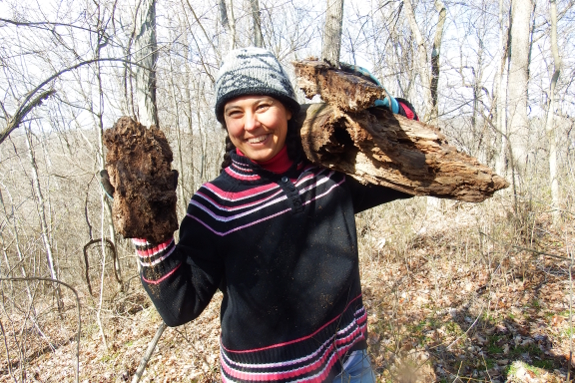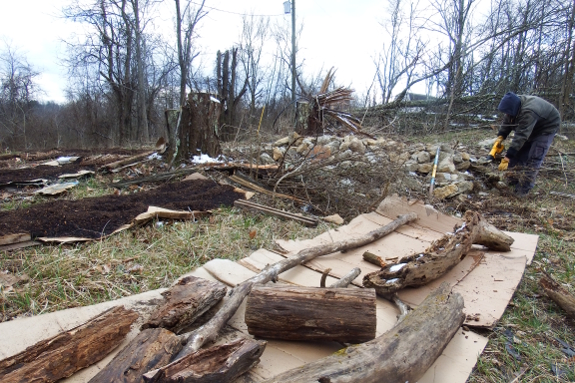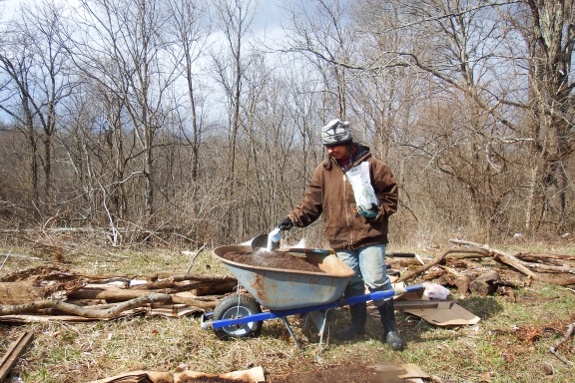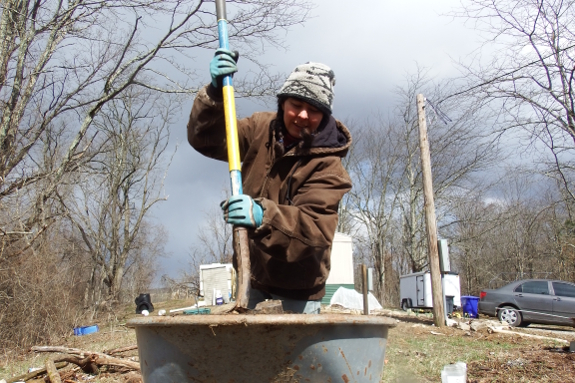
Preparing a blueberry bed

I really meant to prep
our blueberry bed the instant we landed on our new property. After all,
soil acification takes several months, especially in cold winter soil.
But getting our water turned on, installing a source of heat, then
keeping the pipes from freezing seemed slightly more important...so
here it is a week before the bushes arrive and I have no soil ready to
put them in.
Which is a long way of
saying, before I dive into the rest of this post, please do as I say
not as I do. Prepare your blueberry beds months in advance!

Okay, caveat aside, back
to the point at hand....
Blueberries like three
things --- lots of organic matter, lots of water, and lots of acidity.
The first two points can be assisted by starting your bed off with a
healthy helping of punky wood (placed atop a kill layer of cardboard in
this image so we don't need to till). In a perfect world, this wood is
already starting to crumble apart, although any logs and limbs dead
enough to fall to the forest floor will do in a pinch.

Since rotting wood will
rob some nitrogen out of the soil for the first couple of years, I'm
going very heavy on the nutrients in our blueberry bed. In fact, we're
filling in all the gaps between the wood with straight compost...well,
straight compost laced with sulfur.
"Sulfur?" you say. "That
doesn't sound very natural." Unfortunately, I learned the hard way with
our last blueberry patch that natural
methods of acidifying the soil aren't quite enough for these
acid-loving plants.
So I bought five pounds of ferrous
sulfate (faster acting than elemental sulfur) and did some
back-of-the-envelope math to figure out how much to apply.

Without a pH test and
with blueberries hitting the ground in short order, I'm playing it safe
and assuming I'll need to top up the sulfur every year for a couple of
seasons. To that end, I used one heaping cup per wheelbarrow load of
compost (which is much easier to mix if you sprinkle half a cup on top
of half a wheelbarrow of compost then repeat with the second half on
top of the full load). This assumes the compost has a pH around 6.5,
the underlying soil is clay loam, and that you're using ferrous sulfate
--- for elemental sulfur, lower the application rate down to two
tablespoons per wheelbarrowful of compost.
I guess we'll know by
the end of the summer whether the blueberries approve of their new
home. We only bought three test plants to get us started, but if they
do well I suspect we'll expand.
Want more in-depth information? Browse through our books.
Or explore more posts by date or by subject.
About us: Anna Hess and Mark Hamilton spent over a decade living self-sufficiently in the mountains of Virginia before moving north to start over from scratch in the foothills of Ohio. They've experimented with permaculture, no-till gardening, trailersteading, home-based microbusinesses and much more, writing about their adventures in both blogs and books.
Want to be notified when new comments are posted on this page? Click on the RSS button after you add a comment to subscribe to the comment feed, or simply check the box beside "email replies to me" while writing your comment.

Love watching you two begin again and turn this place into something special. Did you get more than one type of blueberry? If so don't worry about buying new plants to expand. Use cuttings instead. They root super easy and grow fast! If you only bought 1 variety then buying a second will increase your production.